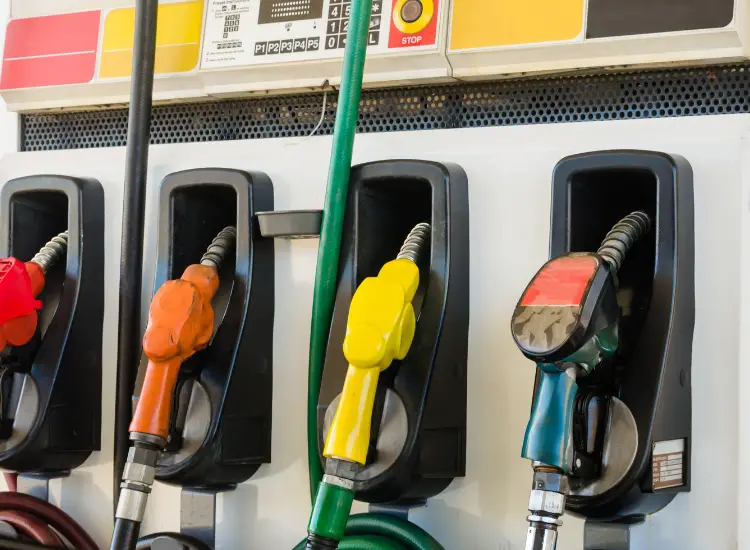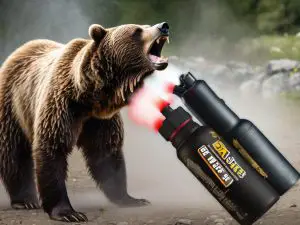What is a Good Coleman Fuel Substitute? Find Out the Best Alternatives!

Looking for a good Coleman fuel substitute? Whether you’re camping in the great outdoors or experiencing a power outage at home, having a reliable fuel source is essential. While Coleman fuel is a popular choice, there are alternatives out there that can work just as well. In this article, we’ll explore some of the best substitutes for Coleman fuel and discuss their pros and cons.
Coleman fuel, also known as white gas, is a highly refined form of gasoline that is specifically designed for camping stoves, lanterns, and other outdoor equipment. It burns cleanly and efficiently, making it ideal for outdoor cooking and lighting. However, it can sometimes be difficult to find and may be expensive. That’s why it’s good to know that there are other options available.
From unleaded gasoline to kerosene and even alcohol-based fuels, there are several alternatives to consider when you don’t have access to Coleman fuel. Each option has its own advantages and drawbacks, so it’s important to understand what makes them different and how they perform in various situations. So keep reading to discover the perfect Coleman fuel substitute for your needs!
Quick Links
Why Would You Need a Coleman Fuel Substitute?
There are several reasons why you might need a Coleman fuel substitute. Coleman fuel, also known as white gas or camping fuel, is commonly used for camping stoves, lanterns, and other outdoor equipment. However, there may be situations where Coleman fuel is not readily available or convenient to use. In such cases, finding a suitable alternative can be beneficial. Whether you’re exploring alternative fuel options or facing an unexpected shortage of Coleman fuel, having a substitute on hand ensures you can still enjoy your outdoor activities without interruption.
Safety Considerations when Using a Coleman Fuel Substitute
When using a substitute for Coleman fuel, it is important to prioritize safety to avoid any hazards or accidents. While alternatives can be effective, there are certain considerations to keep in mind to ensure safe usage. Here are some important safety guidelines when using a Coleman fuel substitute:
Compatibility and Suitability
Not all fuel substitutes are suitable for use in Coleman stoves or lanterns. It is crucial to ensure that the substitute you choose is compatible with your specific Coleman equipment and designed for similar applications. Using an incompatible or unsuitable fuel substitute can lead to malfunction, fire hazards, or damage to the equipment. Always refer to the manufacturer’s recommendations or consult with experts to determine the appropriate substitute for your Coleman device.
Proper Storage and Handling
Like Coleman fuel, certain substitutes may be flammable or hazardous if mishandled or improperly stored. It is essential to follow proper storage and handling practices to minimize the risks associated with these substances. Store the fuel substitute in a cool, well-ventilated area, away from direct sunlight, heat sources, and flammable materials. Use appropriate containers designed for fuel storage and ensure they are tightly sealed to prevent leakage or evaporation. Keep the substitute out of reach of children and follow any specific storage or handling instructions provided by the manufacturer.
Adequate Ventilation
When using a Coleman fuel substitute indoors, ensure proper ventilation to prevent the buildup of potentially harmful gases. Some substitutes may emit carbon monoxide or other toxic fumes when burned, posing health hazards in enclosed spaces. Use your Coleman device in a well-ventilated area, such as an open room, or consider using it outdoors to ensure a constant supply of fresh air and minimize the concentration of harmful gases. Never use fuel substitutes in poorly ventilated or confined spaces, such as tents or cabins, without proper ventilation measures in place.
Fire Safety Precautions
Always practice proper fire safety precautions when using a Coleman fuel substitute. Keep fire extinguishing equipment, such as a fire extinguisher or water source, readily available in case of emergencies. Avoid using the substitute near flammable materials or in areas where fire hazards are present. Monitor the flame or heat source during usage and do not leave it unattended. In the event of a fire or any signs of malfunction or fuel leak, immediately extinguish the flame, stop using the substitute, and safely evacuate the area if necessary. It is advisable to familiarize yourself with fire safety protocols and procedures before using any fuel substitute.
Follow Manufacturer’s Instructions
Each Coleman fuel substitute may have specific usage instructions or precautions provided by the manufacturer. It is crucial to carefully read and follow these instructions to ensure safe and effective usage. The manufacturer’s guidelines may include specific details about fuel storage, equipment compatibility, usage recommendations, safety precautions, and emergency procedures. Adhering to these instructions will help minimize risks and ensure a positive experience when using a Coleman fuel substitute.
By prioritizing safety and following these considerations, you can confidently and responsibly use a Coleman fuel substitute as an alternative for your outdoor activities or emergency situations.
Popular Coleman Fuel Substitutes
If you’re in a situation where you don’t have access to Coleman fuel, there are several alternatives that you can use. These substitutes can be handy when you’re camping, hiking, or during emergency situations. However, it’s important to note that not all alternatives may provide the same level of performance as Coleman fuel. Here are some popular Coleman fuel substitutes:
- Unleaded gasoline: Regular unleaded gasoline can be used as a substitute for Coleman fuel. It is readily available and can be found at gas stations. However, it is important to use caution, as gasoline is more flammable than Coleman fuel and may produce more soot and fumes.
- Kerosene: Kerosene is another common substitute for Coleman fuel. It burns at a lower temperature than gasoline, making it suitable for camping stoves and lanterns. However, kerosene may produce more odor and smoke compared to Coleman fuel.
- White gas: White gas, also known as naphtha, is a popular alternative to Coleman fuel. It is clean-burning and has a high energy output. White gas is often used in backpacking stoves and lanterns.
- Propane: Propane can be used as a substitute for Coleman fuel in some camping appliances, such as camping stoves and grills. However, it is important to have the proper equipment and adapters to use propane as a substitute.
Before using any of these substitutes, it is important to read the manufacturer’s instructions and guidelines to ensure safe and proper usage. Additionally, it is advisable to test the substitute fuel in a controlled environment before relying on it in a critical situation.
Pros and Cons of Using a Coleman Fuel Substitute
Pros of Using a Coleman Fuel Substitute
- Availability: Coleman fuel substitutes are often more readily available than Coleman fuel itself, making it easier to find and purchase.
- Cost: In some cases, Coleman fuel substitutes may be cheaper than Coleman fuel, providing a more cost-effective alternative.
- Versatility: Certain Coleman fuel substitutes can be used not only for outdoor camping stoves but also for other applications like lanterns and portable heaters.
- Reduced Environmental Impact: Some Coleman fuel substitutes are made from renewable or cleaner-burning sources, minimizing their impact on the environment.
Cons of Using a Coleman Fuel Substitute
- Compatibility: Not all Coleman fuel substitutes are compatible with every camping stove or device, so it’s important to ensure compatibility before use.
- Performance Variability: The performance and efficiency of a Coleman fuel substitute may vary compared to using Coleman fuel, potentially affecting cooking times and heat output.
- Safety Concerns: It’s important to carefully follow manufacturer instructions and safety guidelines when using a Coleman fuel substitute to minimize the risk of accidents or damage.
- Limited Availability: Depending on the region or location, the availability of Coleman fuel substitutes may be limited, making it challenging to find suitable alternatives.
When considering a Coleman fuel substitute, it’s crucial to weigh the pros and cons to determine if it is the right choice for your specific needs. Additionally, always consult the manufacturer’s recommendations and guidelines to ensure proper usage and safe operation.
How to Properly Store a Coleman Fuel Substitute
Storing a Coleman fuel substitute properly is essential to maintain its quality and safety for future use. Improper storage can lead to degradation or even hazardous situations. Follow these guidelines to ensure you store your Coleman fuel substitute correctly:
- Choose a suitable container: Use a sturdy, leak-proof container specifically designed for storing fuel. Avoid using containers that may react with the fuel or compromise its integrity.
- Keep it in a cool, dry place: Store the fuel substitute in a well-ventilated area away from direct sunlight and sources of heat. Excessive heat can negatively affect the quality and stability of the fuel substitute.
- Store in a secure location: Keep the fuel substitute out of reach of children and pets to prevent accidents or unauthorized access.
- Label the container: Clearly label the container with the contents and date of storage to easily identify the fuel substitute and ensure proper rotation of stock.
- Keep away from open flames or sparks: Store the fuel substitute away from any potential ignition sources to minimize fire or explosion risks.
- Check for leaks or damage: Regularly inspect the container for any signs of leaks or damage. If you notice any issues, transfer the fuel substitute to a new container or dispose of it properly.
- Follow manufacturer recommendations: Refer to the manufacturer’s instructions on the container or packaging for specific storage guidelines and any additional precautions.
By following these storage guidelines, you can ensure that your Coleman fuel substitute remains safe and ready for use when needed.
DIY Coleman Fuel Substitute Recipes
1. Denatured Alcohol
Denatured alcohol is one of the most popular substitutes for Coleman fuel. It is a liquid fuel made from ethanol, but with additives to make it poisonous or unpalatable. Denatured alcohol burns efficiently and can be used in most camping stoves and lanterns that require Coleman fuel. It is readily available in most hardware stores.
2. Unleaded Gasoline
Unleaded gasoline can also be used as a substitute for Coleman fuel in a pinch. However, it’s important to use caution when using gasoline as it is more volatile and can lead to more hazardous situations if not handled properly. Only use unleaded gasoline in well-ventilated areas and take precautions to prevent accidental spills or fires.
3. Kerosene
Kerosene is another viable alternative to Coleman fuel. It is a common fuel used for heating and lighting and can be used in camping stoves and lanterns that are compatible with liquid fuels. However, it’s important to note that kerosene has a distinctive odor and may produce more soot when burned compared to Coleman fuel.
It’s important to remember that while these substitutes can work, they may not perform as efficiently as Coleman fuel or be compatible with all camping equipment. Always refer to the manufacturer’s guidelines and instructions before using any substitute fuel. Safety should be the top priority when choosing a substitute for Coleman fuel.
Testing and Comparing Different Coleman Fuel Substitutes
Finding a suitable substitute for Coleman fuel can be essential when camping or during emergencies. While Coleman fuel is a popular choice for camping stoves and lanterns, there are alternatives available that can work just as well. Here is a brief paragraph followed by a bullet list of different Coleman fuel substitutes that have been tested and compared:
- Unleaded gasoline: Unleaded gasoline can be used as a substitute for Coleman fuel in camping stoves and lanterns. It provides similar performance and is readily available.
- Kerosene: Kerosene can be a viable alternative to Coleman fuel. It burns cleanly and provides a high heat output. However, it may have a slightly different smell and can be more difficult to find in some areas.
- White gas: White gas, also known as naphtha, is another common substitute for Coleman fuel. It is highly flammable and efficient for camping stoves and lanterns.
- Rubbing alcohol (isopropyl alcohol): Rubbing alcohol can work as an emergency substitute for Coleman fuel. It burns cleanly but may not provide the same heat output. It is best to dilute rubbing alcohol with water to ensure safe burning.
- Denatured alcohol: Denatured alcohol can also be used as a substitute for Coleman fuel. It burns with a clean flame and is a popular choice for lightweight camping stoves.
When using any substitute fuel, it is important to follow proper safety precautions and consult the manufacturer’s guidelines for your specific camping stove or lantern. Testing and comparing different Coleman fuel substitutes can help you find the best alternative for your needs while ensuring safe and efficient operation of your camping equipment.
Where to Purchase a Coleman Fuel Substitute?
If you are looking for a Coleman fuel substitute, there are several options available for purchase. While Coleman fuel is a specific type of fuel designed for Coleman camping stoves and lanterns, there are alternative fuels that can be used as substitutes. Here are some places where you can find a Coleman fuel substitute:
- Outdoor and camping supply stores: These stores often carry a variety of camping fuels, including alternatives to Coleman fuel. You can visit a local outdoor or camping supply store to find suitable substitutes.
- Online retailers: Online retailers like Amazon, REI, and Walmart offer a wide range of camping fuels and accessories. You can search for Coleman fuel substitutes on these platforms and have them delivered to your doorstep.
- Hardware stores: Some hardware stores may stock alternative fuels that can be used as substitutes for Coleman fuel. Check with your local hardware store to see if they carry any suitable options.
- Automotive stores: Certain automotive fuels, such as white gas or unleaded gasoline, can serve as substitutes for Coleman fuel. Automotive stores might have these fuels available for purchase.
When purchasing a Coleman fuel substitute, make sure it is compatible with your specific camping stove or lantern. It’s important to follow the manufacturer’s recommendations and guidelines for fuel usage to ensure safe and efficient operation of your camping equipment.
Conclusion
When it comes to finding a suitable Coleman fuel substitute, there are several options available. Unleaded gasoline, kerosene, white gas, rubbing alcohol, and denatured alcohol are all potential substitutes that can be used in camping stoves and lanterns. However, it is important to prioritize safety and ensure compatibility with your specific equipment.
Overall, finding a suitable Coleman fuel substitute requires careful consideration of safety, compatibility, and performance factors. With the right substitute and proper usage, you can continue to enjoy your outdoor activities while ensuring a safe and efficient camping experience.




![33 Troubling Hiking Injury & Death Statistics [Important Trends]](https://hikersdaily.com/wp-content/uploads/2022/07/hiking-injuries-and-death-statistics-300x300.jpg)

